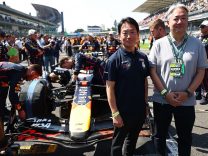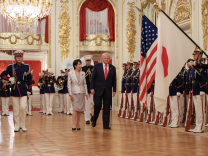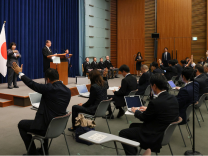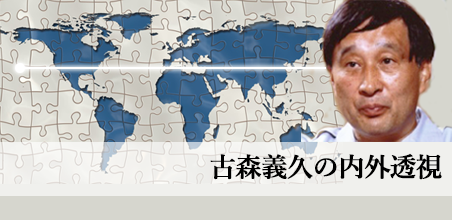[Hiroyuki ABE]Healthcare cost Reduction Attempts by Industrial-Academic-Government Cooperation built New Business Models[Healthcare Tour in the Netherlands (Part.3)]
Hiroyuki ABE (journalist)
Profile|Website|Twitter|Facebook
“Browsing through a Medical Tour in the Netherlands.
Sharing global knowledge to solve the world’s problems.(3)”
Starting Day 2 (Jan 21st) of a discovery Tour of the Healthcare situation all around the Netherlands.
This morning we were taken to Synapse bv, a company located in the now famous for its treaty City of Maastricht. It was founded in 2009 as a working group within the Cardiovascular Research Institute Maastricht (CARIM) as well as a company within the Maastricht University Holding. This University registers into private companies research groups with high industrial potential. The field that Synapse hopes to push to the market is Hemostasis & Thrombosis Prevention. Through studies of blood coagulation mechanism and substances that can prevent it – antiplatelet – they undergo research to a cure for hemophilia. This research has also lead to the development of an easy-to-use Blood Component Analyzing device.
In Japan we do have ventures such as Carepro (*), which offers “one-coin” analysis, but the difference with Synapse’s device is that it is a tool with which you can easily take your own blood sample and analyze it, then send the results to your smartphone. You can store your information and do some follow-up according to your cumulative results, all by yourself. Synapse is thinking of new business models and is hoping to sell the device to Research Institutes and Healthcare Programs within 3 years. Even though it still doesn’t have a name, I thought that if they can fix it at the right cost, there is plenty of room on the market for such device.
Moreover, I was very impressed by the fact that some working groups, although belonging to a university, were well aware that they had to quickly put their research into the industry in order to survive. I am not sure we do have this type of structure in Japanese Medical Schools. Most University Hospitals in Japan are said to be in the red, so I think that the Netherlands’ system could be great benchmarking.
Hopping to our second visit of the day, we were then taken to The Maastricht Study research laboratory. Here they focus mainly on diabetes. Spreading at high-speed around the world, diabetes is known to be one of the deepest medical problems on the planet nowadays.
Over 1.3 million people die of the disease each year, and in the Netherlands alone, there were 750,000 patients diagnosed with type 2 diabetes in 2013, a number suspected to reach over 1 million by 2025. The costs related to this disease is evaluated to more than 1.4 trillion yen (1 euro=140 yen). 75% of patients with type 2 diabetes die of heart diseases, and their average life expectancy is shorter than 6 years. As the risk for associated additional diseases is extremely high, it has become very urgent to find effective ways for cure and prevention.
In Japan, 8.9 million people are diagnosed with serious diabetes and 13.2 million are in minor stage. In total, over 22.1 people suffer from the disease in our country. According to data taken from a study on National Citizens Health and Nutrition conducted in 2007, we accounted 14,000 deaths caused by diabetes, more than 15,000 people were conducted artificial dialysis following kidney disorders directly caused by diabetes, and over 3000 people had developed visual disorder because of the disease, within a year.
In 2010, the Japanese government has made plans to reduce the number of people affected by diabetes from 10.8 million to 10 million. They call the move “reduction of metabolic syndrome,” which is strongly caused by lack of exercise and bad dietary habits, but I wonder how many people realize this endeavor is related to diabetes.
At The Maastricht Study institute, they also put the emphasis on their close relation with the private sector, as they have cooperations with not only pharmaceuticals, but also food companies or medical device makers. Medical science and the private sector cannot work apart. It is a matter of finding together where we can lower the high-rising healthcare-associated costs in our society. And the Netherlands’ industrial-academic-government cooperations, which are striving to construct new sustainable business models to resolve those problems, show great examples for us to re-think our own strategies.
(*) Carepro: http://carepro.co.jp/
【あわせて読みたい】
 【滝川クリステルの動画番組】『今、何を考え、どう動くべきか』第二回
【滝川クリステルの動画番組】『今、何を考え、どう動くべきか』第二回- 認可保育所と認可外保育施設で、死亡事故の報告件数に大きな違い〜保育施設への国家的な危機管理の整備を(石川和男・NPO法人社会保障経済研究所理事長)
- 2013年のヒット商品から見えること〜価格ではなく品質や機能を重視した「日本人としての誇りを取り戻す」商品やサービスが好調(野田万起子・インクグロウ株式会社 代表取締役社長)
- 日本に「出口」はあるのか〜「不良債権問題はないが、経済を成長させるエンジンの馬力がない日本」が陥る「長期停滞」のリスク(藤田正美・元ニューズウィーク日本版編集長)
- 外国人でも70万円で安楽死ができる国スイス〜最先端の安楽死制度を持ち、自殺幇助が合法のスイスには安楽死ツアーもある(磯村かのん・通訳/起業家)
- もしも警察に捕まったら!対応には要注意!|デイビッド・セインの“意外と知らない?!知っておきたい!英会話”(デイビット・セイン・英会話講師)





























